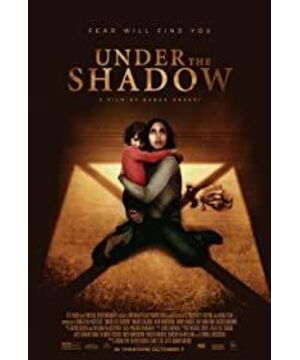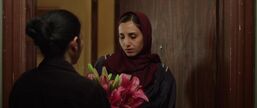For most people, watching a horror film set in Iran with characters speaking Persian is a novel experience. But soon, you will find that this "Under the Shadow" is just a horror film in the shell, and the core is actually a psychological exploration film under the war. The dark cloud of the Iran-Iraq war, the blocked open consciousness and modernization process, and the repressed women, this inner fear has all been condensed into the illusion of gods and ghosts. It has to be said that this is indeed a unique excavation of the horror genre.
During the Iran-Iraq war, Iraq carried out continuous bombings on Iran, and Tehran was in crisis. Before that, her husband was sent to the front line as a doctor, and the heroine stayed alone in Tehran to take care of her feverish and sick daughter. The husband wanted them to leave the city as soon as possible to seek refuge with their in-laws, but the stubborn woman insisted on staying. The neighbors in the building fled one after another, leaving only the mother and daughter. As the bombardment intensified, some terrifying visions began to surround them.
The unique dangerous atmosphere of horror films and the squeeze of war on human nature, especially Iranian women, have reached a wonderful agreement in this film. There is no better way to present this depression, panic, and helplessness. emotion. "Under the Shadow" shows the step-by-step process of the maddening and final collapse of the terrorist attack, which is also cooperating with the intensification of the psychological fear of women in Iran during the war.
The movie opens with the most everyday scene. A woman was rejected by an increasingly conservative society because of her enthusiasm for public affairs. She was no longer allowed to continue her studies in medical school, and her dream of becoming a doctor was ruined. From there, this became her first step into a nightmare. Becoming a doctor means the possibility of a woman becoming independent, as well as the possibility of interacting with society and the outside world. It is more of a self-affirmation and an expectation to be involved in modern life. The film ends all of this with a conversation, Dean. The power system endorsed ruthlessly imprisoned a woman with a dream in the family, and since then, the apartment has been painted as a prison.
"Under the Shadow" is full of symbolic details. The woman only wears the hijab when she has to deal with it. She has to follow the American aerobics video every day. The body is in the real environment of Iran, but her heart has never been imprisoned. She never deliberately separates herself because of her female identity. She regards herself as a "person" rather than a person with special attributes. "Women" bound by rules and traditions. Before this, it was no problem, but as the war progressed, everything changed subtly.
At first, the landlord of this building found that the garage door was not properly closed, and instinctively believed that it was a woman's omission, because in his heart, a man would not make such a mistake; later, when someone knocked on the door, the first thing a woman had to do was Hide the video of the aerobics; after that, she ran into the street out of fear, and the first thing the military saw her was not to help, but to threaten that she should be whipped if she went out in such a disheveled way . To a certain extent, this story writes a process of the fall of freedom, and with the advent of war, people began to move towards closure. And that's how fear is brewed.
The little daughter who accompanied her has been chanting the story of the local folklore "Giant". This evil dark fairy tale is regarded as taboo and unclean by many people. At first, the heroine just thought it was a game and a prank. , this turned into a hallucination after the child had a fever and illness, and soon, as an adult, she also began to see the giant spirit like a real thing.
At this time, in the midst of the rumble of artillery fire and the fear and helplessness of the future, the "giant" seems to have broken away from the category of gods and ghosts, and has become a clear political metaphor, the high pressure and the imminent power that have been floating overhead. , and the increasingly obvious anxiety about femininity, all brought to fruition through the imagery of the "giant". If the missile that passed through the wall was a physical attack, then the giant spirit that has been floating is a psychological nightmare. The latter is far more devastating than the former, and it can drive people into despair and madness through a little penetrating fear. Robes fluttering in the wind, hooded mirror images are treated as images of terror, and all of this is far stronger than artillery fire.
The increasingly emptied house gradually became a desolate metaphor for the heroine's inner world. Friends, neighbors, and even the closest and supportive husband have all left, and this place has become a lonely grave. Compared with bombing, mental control is a thicker shadow. Coercion, power, and sexism are the real ghosts.
It's a low-budget work, the robes floating in the air look so unadorned, but it fits the atmosphere of the story and the broken heart of the protagonist so well. This horror film, co-produced by the United Kingdom, Qatar and Jordan, has an extremely rare quality that expands the presentation of war and political themes, and also expands the spiritual boundaries of the horror genre. It represented Britain at the Oscars because of this unique mashup, and the moral courage, critical stance, and unequivocal cry for human freedom and independent dignity.
View more about Under the Shadow reviews











